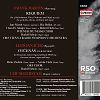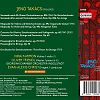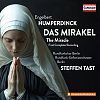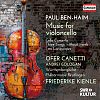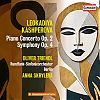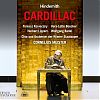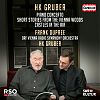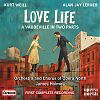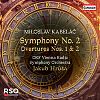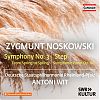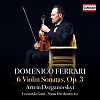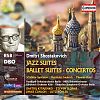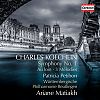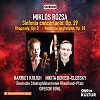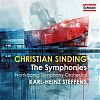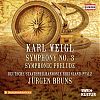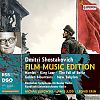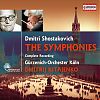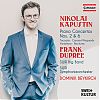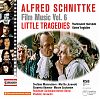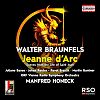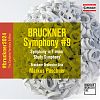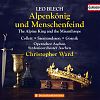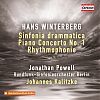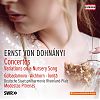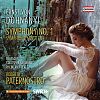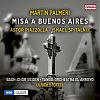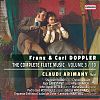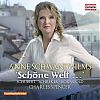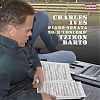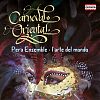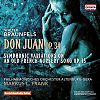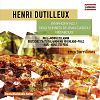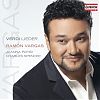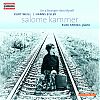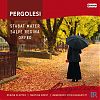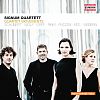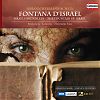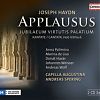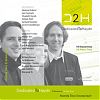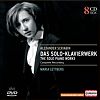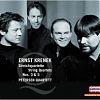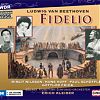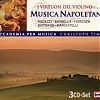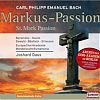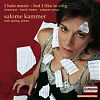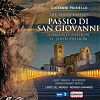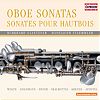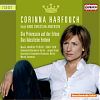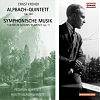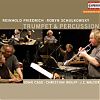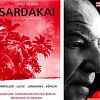cd

Frank Martin
Marsh · Bollen · Ahnsjö · Zednik · Holl · Wiener Jeunesse Chor · ORF Vienna Radio Symphony Orchestra · Leif Segerstam
/
/
[1] – [8]
FRANK MARTIN (1890-1974)
REQUIEM
für 4 Solostimmen, Chor, Orchester und Orgel (1971/72)
for 4 soloists, chorus, orchestra and organ
Jane Marsh, Sopran / soprano · Ria Bollen, Alt / alto
Claes H. Ahnsjö, Tenor / tenor · Robert Holl, Bass / bass
WIENER JEUNESSE CHOR
Rudolf Scholz, Orgel / organ
ORF VIENNA RADIO SYMPHONY ORCHESTRA
[9] – [13]
LEOŠ JANÁČEK (1854-1928)
OTČENÁŠ (OUR FATHER)
für Tenorsolo, Chor, Orgel und Harfe JW IV/29
for tenor, chorus, organ and harp
Heinz Zednik, Tenor / tenor · Arcola Clark, Harfe / harp · ORF CHOR
Rudolf Scholz, Orgel / organ
LEIF SEGERSTAM, Dirigent / conductor
Two treasuries out of the ORF Archive (Austria Broadcasting Corporation):
It took Frank Martin a long time to heed his deep-seated inner calling to write a Requiem:
'What I have tried to express here is the clear will to accept death; to make peace with it.' The Requiem was composed in 1971/72, Martin utilizes the whole bandwidth of orchestral sound and explores all opportunities for interplay among the vocalists, as well. Leoš Janáček’s setting of the Otčenáš, the Lord’s Prayer, is not a conventionally religious work. The Czech composer was more interested in its social aspects than any theological musings. Conductor Leif Segerstam, Chief conductor of ORF Vienna radio Symphony Orchestra from 1975-1983 loved to surprise his public with non-mainstream repertoire. Two of these live recordings are now restored, re-mastered and first time published for the future.
Hörprobe
Weitere Bilder

ERNST VON DOHNÁNYI
Sofja Gülbadamova · Silke Aichhorn · Andrei Ioniţă · Deutsche Staatsphilharmonie Rheinland-Pfalz · Modestas Pitrenas
[1] – [14]
Variationen über ein Kinderlied für Klavier und Orchester op. 25 (1914)
Variations on a Nursery Song for piano and orchestra, Op. 25
[15] – [17]
Concertino für Harfe und Kammerorchester op. 45 (1952)
Concertino for Harp and Chamber orchestra, Op. 45
[18] – [20]
Konzertstück D-Dur für Violoncello und Orchester op. 12 (1904)
Konzertstück in D major for cello and orchestra, Op. 12
Sofja Gülbadamova, Klavier / piano (1-14) · Silke Aichhorn, Harfe / harp (15-17)
Andrei Ioniţă,Violoncello / cello (18-20)
Deutsche Staatsphilharmonie Rheinland-Pfalz
Modestas Pitrėnas, Dirigent / conductor
Of the works Ernst von Dohnányi wrote for the stage, only his ballet pantomime The Veil of Pierrette (Capriccio-CD C5388) receive any particular acclaim. His concert music, meanwhile, was much more warmly received. With this already sixth recording of his late romantical, sensual music, deeply rooted in the Austro-German classical tradition, Capriccio presents three of his concerts. Apart from two piano concertos and two violin concertos, Ernst von Dohnányi wrote three more, which are concertos in all but name Variations (for piano and orchestra), Concertino (for harp and chamber orchestra), and Konzertstück (for cello and orchestra); the names subtly hinting at their specific character.
Hörprobe
Weitere Bilder

ZYGMUNT STOJOWSKI (1870-1946)
DEUTSCHE STAATSPHILHARMONIE RHEINLAND-PFALZ · ANTONI WIT
Suite für Orchester Es-Dur op. 9 (1891)
Suite for Orchestra in E flat major, Op. 9
(Hommage à Hans von Bülow)
DEUTSCHE STAATSPHILHARMONIE RHEINLAND-PFALZ
ANTONI WIT, Dirigent / conductor
Hörprobe
Weitere Bilder

JENÖ TAKÁCS
Oliver Triendl · Nina Kamon · Georgian Chamber Orchestra Ingolstadt · Evan-Alexis Christ
JENÖ TAKÁCS (1902-2005)
Serenade after ancient Contredanses from Graz, Op. 83b for strings
Rhapsody for violin and strings, Op. 49a 'Hungarian Tunes'
Concerto for piano, strings and percussion, Op. 60
Passacaglia for strings, Op. 73
Three Pieces for Strings (1993)
NINA KARMON, Violine / violin· OLIVER TRIENDL, Klavier / piano
GEORGIAN CHAMBER ORCHESTRA INGOLSTADT
EVAN-ALEXIS CHRIST, Dirigent / conductor
His works have accompanied generations of beginner instrumental students on their first foray into contemporary music. But also with his works like the Concerto for Piano, Strings, and Percussion Jenö Takács clearly placed himself in a line with the great paragons Béla Bartók and Zoltán Kodály. Getting to know Bártok further increased the Hungarian element (topicality, rhythm, bitonality) in his compositions. With the impressionist coloring and the influences of Hungarian folk music studying with Joseph Marx added a strict contrapuntal note to his works. Jenö Takács was a humanist, a ‘musical cosmopolitan’, an eyewitness of almost the entire 20th century.
Hörprobe
Weitere Bilder

PANCHO VLADIGEROV: ORCHESTRAL WORKS · 3
BULGARIAN NATIONAL RADIO SYMPHONY ORCHESTRA · ALEXANDER VLADIGEROV
COMPACT DISC 1
"Ljulin" Impressionen - Suite für grosses Orchester op. 63 (1972)
'Lyulin' Impressions - Suite for large orchestra, Op. 63
Jüdisches Poem / Jewish Poem, Op. 47 (1949)
Sechs symphonische Novelletten Op. 59/60 (1964/65)
Six Symphonic Novelettes. op. 59/60
Dramatisches Poem, Op. 52 / Dramatic Poem, op. 52 (1956)
COMPACT DISC 2
Sechs exotische Präludien, op.17 / Six Exotic Préludes, Op. 17 (1924)
Drei konzertante Stücke, op. 57 / Three Concert Pieces, Op. 57 (1959/60)
Improvisation und Toccata für Orchester, op. 36a (1941/42)
Improvisation and Toccata for Orchestra, Op. 36a
COMPACT DISC 3
Drei Impressionen für Orchester, op.9 (1920)
Three Impressions for Orchestra, Op. 9
’’Einsamkeit’’ / 'Solitude' – Prelude op. 10 Nr. 3 (1929/56)
Drei Stücke für Streichorchester / Three pieces for string orchestra
Symphonische Legende, op. 8 / Symphonic Legend, Op. 8 (1919)
From the diversity of Bulgarian musical culture Pancho Vladigerov stands out as undoubtedly the most important composer for the musical self-conception of modern Bulgaria. As the mentor of generations of Bulgarian composers in the 20th century, up to now he has formed a salient figure in the music life of his country. Revered as a living legend, he was in a position to continue his work largely unaffected by the demands of the Communist regime, although his musical diction, based on late Romantic tradition and keynote-related tonality, would hardly have provoked any reprisals anyway. With these recordings, produced in the 1970s in Bulgaria, Capriccio releases an 18CD Vladigerov-Edition to preserve this colourful music also for the next generations.


